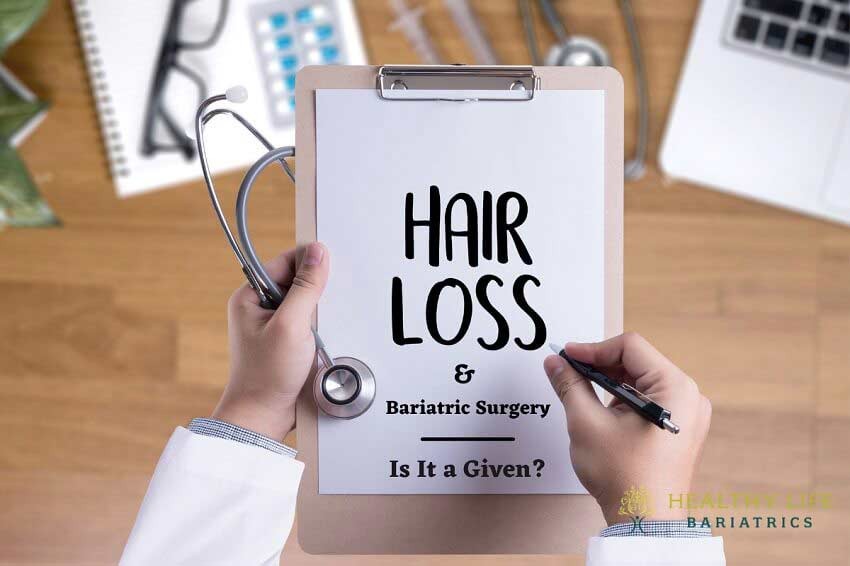
A common concern people have when opting for bariatric surgery is that their hair will fall out. For those who haven’t heard about this side effect of bariatric surgery, you should not be overly concerned.
It is true that hair loss is a normal side effect of some weight loss procedures.
Bariatric patients lose their hair because of their body’s response to the surgery, rapid weight loss, and changes in dietary habits.
Hair is an important part of who you are. It makes up an extensive portion of your self-image and body image, whether you are a man or a woman.
The good news is that you will not lose all your hair. You may see more strands in your hairbrush or in your hands when washing your hair, but the hair loss will eventually subside.
Here is valuable information about hair loss and bariatric surgery, along with tips on how to prevent losing your hair following a weight loss procedure.
What Causes Hair Loss After Bariatric Surgery?

People experience hair loss after bariatric surgery because of a few factors:
Telogen Effluvium
This condition can accompany severe bodily changes, such as undergoing a major surgery like a bariatric procedure.
When you couple surgery with significant weight loss, your body may attempt to readjust. It can do this by rerouting nutrients from your hair to vital organs.
Telogen effluvium is named after the dormant stage of hair growth, otherwise known as the telogen phase.
Normally, at any given time, around 90% of the hairs on your head are in the anagen phase, otherwise known as the growth phase. 10% of the hairs are in the telogen phase or dormant phase.
Hair follicles that are in the telogen phase eventually fall out. This usually takes three to four months, or sooner.
The condition doesn’t result in complete hair loss and most of the time it’s not noticeable (no bald spots, in other words). You merely experience more shedding than is normal for you.
Check for Nutritional Deficiencies
Any bariatric surgery can produce some hair loss. Others affect the way your body absorbs nutrients, such as Roux-en-Y gastric bypass, which could require supplementation for life.
Restrictive surgery like the gastric sleeve doesn’t affect your body’s ability to absorb nutrients, but you can still experience hair loss.
Malabsorptive surgeries can also affect your body’s nutritional absorption. These include surgeries like biliopancreatic diversion (BPD) and BPD combined with a duodenal switch.
Studies Regarding Hair Loss and Bariatric Surgery
A study that followed forty-two women after laparoscopic sleeve gastrectomy (gastric sleeve surgery) found that 41% of the participants experienced hair loss following their procedures. The culprits for the loss of hair, according to the study administrators, were low levels of zinc and iron. Incidentally, taking zinc supplements stopped the hair loss in a majority of the participants.
A different study analyzing hair loss and bariatric surgery discovered that young women with low levels of B9 (folic acid), zinc, and ferritin (protein), tended to experience the most hair loss.
Common Hair Loss Deficiencies After Bariatric Surgery

After bariatric surgery, you need to watch your nutrient levels to ensure hair loss doesn’t happen to you. Here are some to watch out for.
Iron
A deficiency in this nutrient can result in thinning hair.
Zinc
Get low in this nutrient and your hair can become thinner and more brittle. It could also fall out more frequently or otherwise break. A zinc supplement can help.
Copper
This nutrient can cause your hair to thin and potentially change color when it gets too low.
Vitamins C & A
Hair low in these vitamins becomes brittle and may break off.
B9
This vitamin can also cause your hair to thin out.
Tips for Preventing Hair Loss After Bariatric Surgery
It may not be possible to stop hair loss following a weight loss surgery procedure. Every person is different, and some people react differently to surgery than others. There are ways you can work to decrease the amount of hair you lose.
Follow Your Bariatric Surgeon’s Instructions
Your bariatric surgeon will not leave you in the dark with regard to self-care. You will be provided with explicit instructions for keeping yourself well as you heal from surgery and go on to live a healthier lifestyle. Follow the nutritional plan your doctor provides you with to minimize your hair loss risk.
Eat Plenty of Protein
One of the tips your surgeon will give you is to fill your plate with more proteins than starches. You will be placed on a liquid diet in the weeks following your procedure. Drinking nothing but liquids helps your body adjust to the surgical changes. Eventually, solid foods will be added to your diet.
Once you are back to normal foods, eating lean meats, skinless chicken, eggs, dairy, and other protein-rich foods keeps your muscles strong and your body healthy. You will also feel fuller longer when consuming more protein, preventing you from overeating.
Including protein in your meals and snacks can also help prevent excessive hair loss following bariatric surgery.
Take Nutritional Supplements
Your doctor may recommend a list of nutrients and vitamins you should take as a bariatric patient to prevent common medical ailments and hair loss.
You may be advised to take a multivitamin as well as supplements containing iron, zinc, and various vitamins like C, A, and B9. Nutritional deficiencies are common causes of bariatric surgery hair loss but adding these nutrients to your diet can make a significant difference to the amount of hair you lose.
Keep to Your Follow-Up Doctor Visits

The best bariatric surgeon will want to see you often to ensure you are keeping up with your recovery schedule. Your surgeon wants what’s best for you and wants you to experience stellar results. Going to these appointments will keep your weight loss journey on track. Your surgeon can also give you personalized tips during these meetings if hair loss after bariatric surgery is a concern.
Make sure you speak to your doctor before taking any nutritional supplements, as most are unregulated by the Food and Drug Administration. Tell your doctor what brand you are taking, as brands differ in quality, as well as the quantity. You can go overboard with some supplements, which could lead to toxicity. To play it safe, keep your doctor informed of your supplementation regimen.
Will Hair Loss After Bariatric Surgery Grow Back?
Most patients find that their hair does grow back eventually. You may find that it takes around six months for all the dormant hair to follow out. Your body will then begin growing more hair over time.
When is Hair Loss After Weight Loss Surgery Serious?
You should speak with a professional about hair loss after a bariatric procedure if you still notice hair falling out after the six-month mark. This could be a clear sign that your body requires higher quantities of certain nutrients.
If you suspect nutritional deficiencies are causing your hair loss, and it has been six months or more since your weight loss procedure, routine blood work should be able to prove either way if low levels of vitamins or minerals are to blame for this common complication of bariatric surgery.
Want to Learn More About Bariatric Surgery
Your hair is important to you. The last thing you want to do is lose it.
While you may lose more hair than normal in the months following bariatric surgery, the problem should be temporary. Follow the tips above to slow the hair loss or mitigate the side effect entirely.
Instead of focusing on minor and temporary hair loss, it’s better to envision the smaller waist, more energy, and renewed zest for life you are about to have. That’s what most people experience after undergoing bariatric surgery, the safest, most effective method we have for fighting obesity.
You can learn more about bariatric procedures like the gastric sleeve and gastric bypass by calling Healthy Life Bariatrics. We help patients throughout Los Angeles, Encino, and Glendale, California. We also help patients from all over the world using our medical tourism program. Call to schedule a private, one-on-one consultation with world-renowned bariatric surgeon Dr. Babak Moeinolmolki by dialing (310)861-7844.

